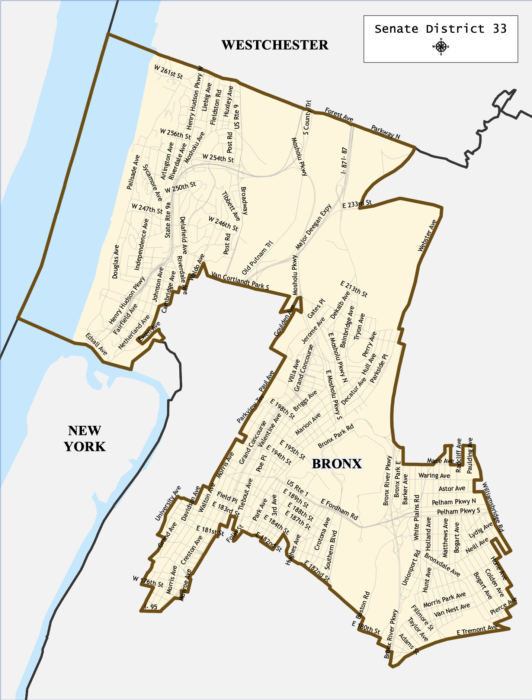The following is a Q&A with New York State Senator Gustavo Rivera, candidate for the state’s 33rd Senate District, which encompasses the neighborhoods of Riverdale, Spuyten Duyvil, Fieldston, Norwood, Fordham, Pelham Parkway, Bedford Park, Belmont, Van Nest and portions of Morris Park.
Name: Gustavo Rivera
Age: 46
Occupation: State senator
Residence: Kingsbridge Heights
Party affiliation: Democrat
One thing the average voter doesn’t know about you: “I enjoy singing and am good at it.”

Q. What is the biggest single issue facing the district?
A. Right now, the biggest issue for parents and kids across our district is education. Mayor (Eric) Adams has cut $469 million from schools, and my opponent has accepted his endorsement as well as money from the charter school industry, which take funding and resources away from public schools. Meanwhile, I’ve worked in the state Senate to figure out statewide solutions to the crisis Mayor Adams created, and directly pushed the mayor on his budget.
Q. The Bronx continues to be the leader in unemployment with the highest rate of joblessness of any county in New York state, based on the latest Labor Department data. What can be done to encourage job creation in the borough?
A. Unions will be a critical part of the process of bringing jobs back to the Bronx, which is why I’m proud to be the candidate with the most union endorsements in this race. But we also need to encourage and support small businesses in the Bronx. That is why I worked to secure millions during the pandemic to help our small businesses recover, and allocated more than $100 million in our state’s budget to redevelop the Kingsbridge Armory into an economic engine for our community.

Q. The state Legislature has been reluctant to address its bail reform laws that were enacted in 2020, despite repeated calls from law enforcement, business owners and even some Democrats, most notably Eric Adams. With the perception that New York City has become “soft on crime,” what do you think should be done so that residents of this city feel safe?
A. Right now, there are two justice systems at play. One is reserved for folks like Kalief Browder, who was put in solitary confinement in Rikers for more than a year without a trial — for allegedly stealing a backpack. And the other is reserved for folks like Harvey Weinstein, who committed heinous crimes but did not experience any of the repercussions that Browder did — because he was able to afford bail. He went home and slept in silk sheets. Kalief Browder went to solitary confinement and eventually committed suicide. We all deserve to be safe and secure and not be subject to violence in our communities, but the punishment must fit the crime. We need truly equal justice, and we also need to make sure our communities feel safe. That means investing in the things that actually build safe communities, from education and health care — including mental health care — to housing and poverty. We also need to invest in tools that work directly with youth to prevent violence and crime from taking place in the first place, which is why I allocate tens of thousands of dollars every year to gun violence prevention organizations in the district.
Q. How would you structure health care in the state; do you support universal health care?
A. I am the lead sponsor of the New York Health Act, which would establish universal health care in New York. As chair of the state Senate Health Committee, I’ve worked tirelessly to expand access to health care across the Bronx and New York state. I am proud to have passed legislation to establish safe staffing ratios, to protect New Yorkers from medical debt and to address racial health disparities. I helped expand abortion access in New York, fought to give our essential workers PPE and the treatment they needed during the pandemic, and called on the Biden administration to release more MPV (monkeypox) treatments and vaccines.
Q. The pandemic exposed what has been a looming mental health crisis. What steps would you take to address mental health in this state from a legislative standpoint and does it require additional funding?
A. We need to expand access to mental health care across our state. Our governor has already announced new investments in psychiatric care – and that’s a promising first step. But we need more. For years, the previous governor and mayor divested from critical mental health interventions our communities need, and it has contributed to long-term distress and the criminalization of people who need help. We need a pipeline of mental health care workers to support a growing need for care.
Q. What differentiates you from your opponent and how would you better serve your constituents, if re-elected?
A. I’ve lived here for decades, organized here and ran for office here to represent the place I call home. I don’t take real estate or charter school money, and will never align myself with right-wing interests who want to close our schools and raise our rents. Sadly, my opponent has done all of this, so she cannot say the same thing. Also, I still proudly represent more than 50% of the newly drawn district and have delivered millions of dollars in programs to this community, as well as having a tireless community affairs team that continues to serve folks in my current district everyday. I also have proven experience as an effective legislator, and we still have much more work to do.
-compiled by Bronx Times staff
























